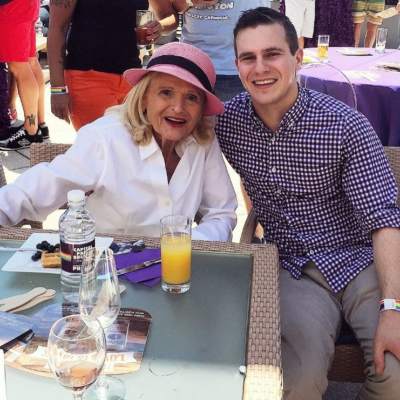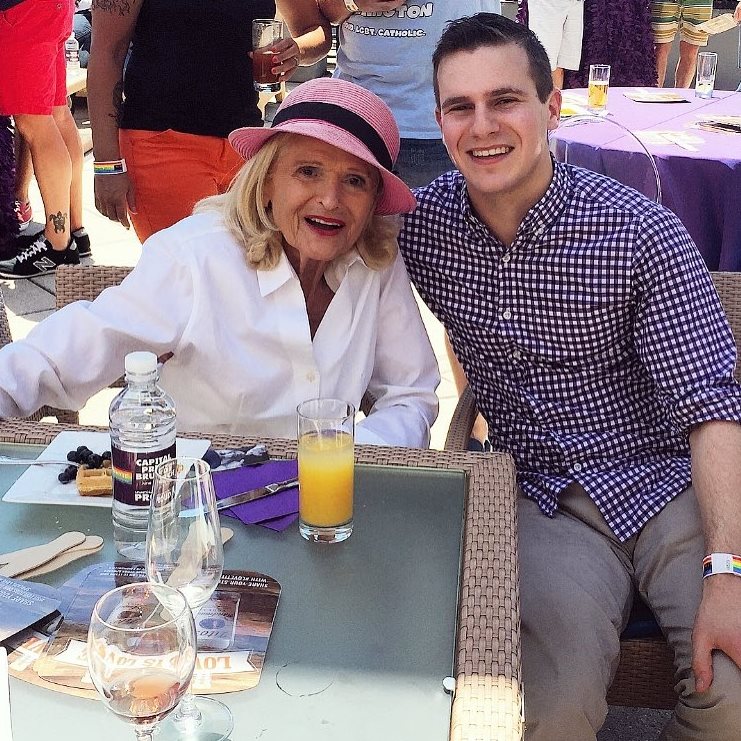A version of this article was published in Times of Israel.
Edie Windsor, who passed away last month at 88, will be remembered as many things – a hero, an icon, a trailblazer, and also rarely emphasized, Jewish. Yes, the same Edie Windsor who led the fight in overturning the Defense of Marriage Act (DOMA) at the Supreme Court in 2013 was very much a Jew. Her case left a profound impact on American history, culture, and law and was instrumental in achieving nationwide marriage equality in 2015.

When we think of American Jewish icons, it’s often artists and entertainers – Mel Brooks, Jerry Seinfeld, Steven Spielberg and Simon and Garfunkel come to mind – and as seen here, they’re almost always men. What makes Edie Windsor’s legacy all the more important is that she is none of these things and yet she has made one of the most lasting impacts on American history.
She shattered the stain glass ceiling in American politics, creating a pathway for LGBT equality like never before. It was Edie’s case which motivated President Obama to change his position on DOMA in 2011 and later marriage equality in 2012. This is more than just incremental legal change. In 1996, the year DOMA was signed into law, only 27 percent of Americans were in favor of marriage equality. Today, support is at 64 percent. This is proof that uprooting marginalizing laws has the power to create dramatic acceptance.
For those of us in the LGBT community, we found a hero in Edie. She became our Rosa Parks – a crusader in dismantling discrimination in the law. In many ways, there was no truer symbol of American patriotism in the last decade than Edie. The founding of this country was based on the premise of unfair taxation by an oppressive government. This too was the crux of what animated Edie’s suit. She was forced to pay more than $360,000 in federal estate tax after her spouse and partner of 44 years, Thea Spyer, died, a bill she would not have incurred had “Thea been Theo.”
Though the Jewish element often gets lost in her story, it is crucial to understanding her life. When Edie grew up, being Jewish was not perceived the same way it is today. Today, Jews have achieved extraordinary levels of success and prominence, but Jews of her time were mostly impoverished first or second generation immigrants who escaped persecution in Europe in the form of pogroms and boycotts on Jewish businesses. Thea Spyer’s family (also Jewish) had fled Amsterdam prior to World War II, and Edie’s family left Russia only to be met with financial woes during the Great Depression. On top of this, Jews were often lumped into the same column of undesirables with Blacks and most certainly homosexuals. To be a gay Jew could be seen as a double hex of rejection and malign. And to be a woman on top of all that only sealed one’s fate of walking the tightrope in a world of adversity.
To have such inner conviction in oneself at that time was in itself a revolutionary act. Inherent in Jewish philosophy is a drive for social justice, or tikkun olam, so perhaps it’s no coincidence that the person to challenge the marriage laws in this country was no other than a Jewish woman.
Edie’s journey to the Supreme Court was also layered with a unique Jewish symbolism. There was the fact that her court cases coincided with major Jewish holidays – her Second Circuit Court of Appeals case landed the day after Yom Kippur (the Day of Atonement), and the Supreme Court case fell in the middle of Passover (a story of liberation). And her death landed in Elul, the month leading up to the High Holy Days, serving as a time of self-reflection and renewal. It was only fitting that among Edie’s eulogizers at Temple Emanu-El was none other than Hillary Clinton. The symbolism was not lost on anyone that the wife of the president who signed DOMA into law was now speaking high praise of the woman who dismantled it. As Clinton said of Edie, “She helped to change hearts and minds, including mine.”
This past spring, I was lucky to finally meet Edie at Capital Pride’s rooftop brunch, a few weeks prior to her 88th birthday. It was a meeting that had been arranged by her second wife and surviving spouse, Judith Kasen-Windsor, who through pure luck discovered an Instagram post I made in honor of the fourth anniversary of oral arguments in U.S. v. Windsor. We had become somewhat of social media “pen pals” in the ensuing months, and I was thrilled she had agreed to make my dream come true. This was a meeting I had dreamed of for years – and to say I was euphoric would be a massive understatement. Meeting Edie was like coming in contact with a guardian angel. No single national figure had transformed my life more dramatically than Edie, so this was quite an honor to say the least.
I’ll always remember the words she told me. I asked if it was hard living during the mid-20th century and she said, “No, it wasn’t hard because I was in love.” That’s just the kind of person she was, celebrating every moment of life with pride.
When I think of all the historical figures that people look up to, no one makes me prouder than Edie Windsor. She exemplified the best of what it means to be Jewish and what it means to be gay.
Some people are so iconic they’re remembered by their first name. There’s Martin, there’s Rosa, there’s Harvey, and now there’s Edie.
It’s up to us to preserve her legacy to inspire future generations of freedom fighters and LGBT advocates. She will be missed but she will never be forgotten. May her memory be a blessing. L’dor vador.
Peter Fox is a student at Miami Ad School. Follow him on Twitter @thatpeterfox.

